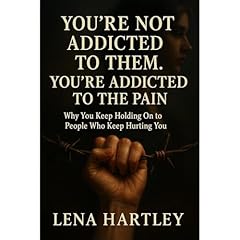
Trauma Bonding
Why You Keep Going Back, Why Nothing Makes Sense & How to Feel Like Yourself Again
No se pudo agregar al carrito
Solo puedes tener X títulos en el carrito para realizar el pago.
Add to Cart failed.
Por favor prueba de nuevo más tarde
Error al Agregar a Lista de Deseos.
Por favor prueba de nuevo más tarde
Error al eliminar de la lista de deseos.
Por favor prueba de nuevo más tarde
Error al añadir a tu biblioteca
Por favor intenta de nuevo
Error al seguir el podcast
Intenta nuevamente
Error al dejar de seguir el podcast
Intenta nuevamente
Prueba gratis de 30 días de Audible Standard
Selecciona 1 audiolibro al mes de nuestra colección completa de más de 1 millón de títulos.
Es tuyo mientras seas miembro.
Obtén acceso ilimitado a los podcasts con mayor demanda.
Plan Standard se renueva automáticamente por $8.99 al mes después de 30 días. Cancela en cualquier momento.
Compra ahora por $9.99
-
Narrado por:
-
Virtual Voice
-
De:
-
Lyla Hart

Este título utiliza narración de voz virtual
Voz Virtual es una narración generada por computadora para audiolibros..
Yeah. I kept going back until I didn't recognize myself anymore.
Maybe you know they're toxic. Maybe you've made pro-and-con lists. Maybe you've blocked and unblocked them seventeen times. Maybe your friends are tired of hearing about it, and honestly? You're tired of yourself.
But here you are again. Checking their social media at 2am. Analyzing their last text for hidden meaning. Planning your escape while simultaneously hoping they'll change.
Here's what nobody tells you: this isn't weakness. This is neuroscience.
You're not "addicted to drama" or "attracted to toxicity." You're trauma bonded—literally neurologically attached to someone who alternates between heaven and hell until your brain gets hooked on the chaos.
The same dopamine pathways that light up with cocaine? They're firing every time your phone buzzes with their name. The same withdrawal symptoms that happen with breaking any harmful pattern? You feel them when you try to walk away.
This isn't your fault. But it is your reality.
And reality is this: they trained your nervous system to crave them. They used intermittent reinforcement—the most addictive behavioral pattern known to psychology—to make you dependent on their approval.
Like a dog waiting for a bell. Like a lab rat pushing a lever for sugar.
One day they're your soulmate. The next, you don't exist. One week you're planning a future. The next, you're begging them to remember why they loved you.
"I feel like I'll die without him. My brain is just... programmed to chase him."
"I know he's toxic but I miss him so much it physically hurts."
Sound familiar? You're not alone. And you're definitely not crazy.
Inside, you'll discover:
• Why you physically ache when you try to leave—and it's not "just" emotional
• How trauma bonding hijacks the same brain circuits as compulsive behaviors
• Why your childhood wounds make you a target (and how to heal them)
• The real reason you keep defending them to people who care about you
• Why "just leave" is like telling someone with anxiety to "just relax"—and what actually works instead
• The withdrawal timeline nobody talks about (spoiler: it gets worse before it gets better)
• How to break free from a person the way you'd heal from any unhealthy attachment
• What happens when you finally feel like yourself again (and why it's worth the hell)
You'll get the science without the academic jargon. The truth without the judgment.
I've been where you are. I know what it's like to feel crazy for loving someone who treats you like you're disposable. I know the shame of going back "one more time." I know what it feels like when people stop believing you really want to leave.
"I've stopped talking to my friends about it because I'm embarrassed."
"I feel so alone and stupid, but I also feel like I can't stop."
I get it. All of it.
You're not weak. You're not stupid. You're not broken.
You're dealing with something most people can't understand because they've never experienced it. You're trying to use logic to solve a neurological problem. And that's exactly why nothing has worked so far.
The confusion ends here. The self-blame stops now.
Because on the other side of trauma bonding is waking up without that crushing weight in your chest. It's finally understanding why you kept going back—and having the roadmap to never do it again.
You've suffered enough. It's not just time to walk away—it's time to come back to yourself.
Las personas que vieron esto también vieron:






Todavía no hay opiniones


